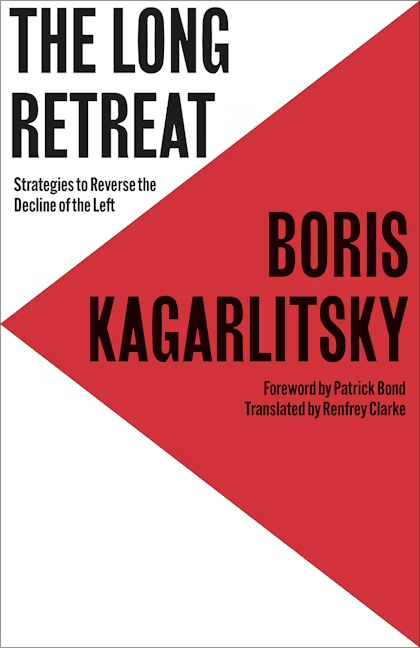Frank Hansen on a challenge to the left
“The Long Retreat – strategies to reverse the decline of the left” by Boris Kagarlitsky published by Pluto Press
The left owe a debt to Boris Kagarlitsky for his work analysing the collapse of the USSR and the rise of neoliberal capitalism in Russia and worldwide. Today he remains a Marxist dissident in his Gulag cell having been sentenced to five years for “supporting terrorism” (opposing the Ukraine war) – 42 years after he was first arrested for promoting “anti-Soviet activities” (agitating for a democratic socialist system).
His latest work, the Long Retreat, is an essential read for anyone interested in the development of socialism/communism in the 20th Century and concerned about the future in a world now dominated by voracious capitalism, where democracy and the left seem in retreat. Kagarlitsky uses Marxist dialectics to analyse how this came about and what needs to be done to revive a democratic socialist alternative. The book is full of insights and fresh ideas, someone can agree with, others are more contentious and thought provoking, such as his take on the New Green Deal, and protests by Canadian truckers. Nevertheless, he throws down a challenge to the left and opens a debate at a critical time. To move forward, it is necessary for us to re-evaluate our history and look critically at current ideas and practice.
The nub of his argument is that 21st Century capitalism, now global and virtually unchallenged by socialism, is in a deep systematic crisis of its own making. Capitalism “has pushed all its contradictions to the limit” producing environmental chaos, international conflict, inequality and social disintegration. At the grassroots, this is generating mass unrest and demands for “anti-establishment” alternatives. While socialist measures are objectively necessary to resolve the crisis, paradoxically, the left seems unable to mount a serious challenge. Across the globe, social democracy has abandoned class and reformist politics and is capitulating to neoliberalism, (e.g. rather than taxing wealth to restore public services and growth in the interests of the oppressed, New Labour is busy peddling deregulation policies to investors).
Moreover, those on the left who retain a socialist perspective tend to stick with traditional formulas and “do not think about what successful revolutionary action can be like in the 21st century”. Controversially, he accuses the left of prioritising culture wars over a socialist programme that can unite the Labour movement, focusing on it its key interests, to challenge capitalism and transform society. This failure is paving the way for right wing populism. As a Marxist, he is clear that theory and praxis are inseparable, change can only be achieved by programmatic clarity and above all political action.
To start his analysis, the book provides a fascinating account of the left debates around the time of the Russian Revolution. An account of the post-war period follows, the Keynsian era of class compromise and the rise of neoliberalism in the 1980s, the evolution of the USSR and the restoration of capitalism by sections of the nomenclature. To stabilise the system after WW2, capitalism was forced to make concessions to the working class through welfare provision, reducing inequality and improving trade union and democratic rights. He describes this as“capitalism’s finest hours, forged not in isolation but in response to the challenge posed by socialism”. Falling profits and technological change eventually led to the rise of neoliberalism, with attacks on organised labour, privatisation and a reversal of social reforms. He describes this as an attempt to stave off crisis by placing profit over social cohesion. The collapse of the USSR then allowed unrestrained capitalism to expand globally. A central theme is that it is a dangerous illusion to think that capitalism needs liberal democracy to function. The trend is now towards the hollowing out of western democracy as it becomes a facade “embellishing oligarchic power,” (something even Joe Biden seems to acknowledge!). China is cited as a model of efficient, modern, autocratic capitalism.
The book may address difficult times, but the final sections on a coalition of resistance and change is optimistic, making the struggle for democracy a central theme. In the UK there are, of course, grounds for optimism – hundreds of thousands have been mobilised in support of the Palestinians. The left should aim to build on this and form the type of alliance based on the policies of “For the Many, Not the Few” of the Corbyn era. We need to constantly challenge the Labour Government to implement real change and reverse the serious erosion of democracy in society and in the LP itself.
As Boris Kagarlitsky said from prison in November 2024 “we must never forget that our goal is freedom and rights for everyone – not only those behind bars, but for those subjected to other forms of oppression around the world”
